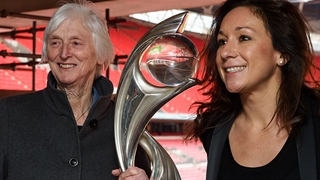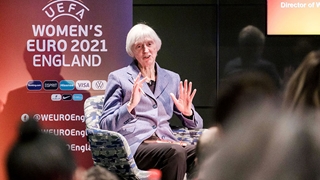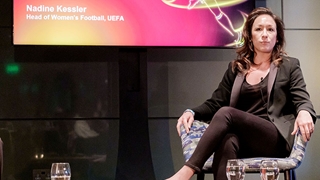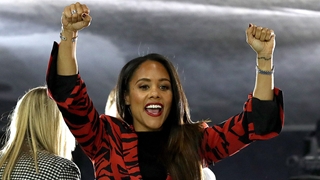
UEFA’s Executive Committee has confirmed that the next UEFA Women’s EURO will be played in England from 6 July to 31 July 2022.
The decision to move UEFA Women’s EURO follows UEFA’s announcement on 17 March that UEFA EURO 2020 would be postponed until 2021, owing to the global outbreak of COVID-19 and the duty of UEFA to protect the health of all those involved in the game, while allowing domestic leagues and European competitions to be completed.
Our director of women’s football Baroness Sue Campbell and UEFA’s chief of women’s football Nadine Kessler now explain the reasons for moving UEFA Women’s EURO to 2022 and the impact it will have on the delivery of the tournament.
Why did UEFA decide to postpone UEFA Women’s EURO to 2022?
Nadine Kessler: Over the last few weeks, together with all stakeholders, we were reconsidering the date of our next UEFA Women’s EURO. When the International Olympic Committee decided to postpone the Olympic Games to the summer of 2021, there was no sportingly viable alternative left than to postpone the Women’s EURO to 2022. The Olympic Games is an important part of the women’s football international match calendar. It’s a prestigious tournament for the women’s game, and one which our players and member associations care deeply about.
Additional guiding factors in this decision-making process were venue availability of host cities selected for the Women’s EURO, maximum exposure for women’s football and the goal to provide the tournament with the centre stage it deserves. This led to a joint conclusion with the Local Organising Committee that 2022 would be the best solution in terms of the development of women’s football.
We firmly believe that this decision is in the best interests of the tournament, the players, the fans, women’s football partners and everybody involved in all areas and at all levels of the game. UEFA Women’s EURO is Europe’s biggest women’s sport event, as well as a major event in worldwide terms. For this reason alone, it’s deserving of its own special and privileged platform.
Sue Campbell: To add to this, I think it’s also important to acknowledge that this in an unprecedented time in which the health and safety of our communities must be our combined priority. We therefore also wanted to ensure that host cities and venues had time to recover from the uncertain situation we all currently find ourselves in, allowing for recovery and stabilisation to deliver the best event possible. When considering all factors together, it was clear that a move to 2022 was the right decision and one which the FA was fully supportive of.
Was there any doubt that England would continue as tournament host?
Sue Campbell: No, never. The commitment and drive from the FA and its partners to deliver a record-breaking women’s EURO has been unwavering. In addition, the support and engagement the tournament has seen to date from host cities, venues, fans, media and other stakeholders across the game has been fantastic and I have no doubt will continue as we look forward to 2022.
Why was the decision not taken at the same time as the postponement of UEFA EURO 2020?
Nadine Kessler: Firstly, UEFA had to take an urgent decision on the postponement of UEFA EURO 2020, as the tournament was only three months away. I know for a fact that the impact that such a postponement would have on UEFA Women’s EURO 2021 was always a key part of the decision-making process. In some ways, we’re lucky that we’ve had more time for the decision on the Women’s EURO. It’s given us more time to hold discussions not only with our tournament hosts, the English Football Association, our member associations and clubs, but also with other competition organisers such as the Commonwealth Games Federation. This has enabled us to reflect and find the best way forward.
How will the postponement affect the FA’s planning and delivery of the tournament?
Sue Campbell: Postponing a major event obviously comes with its challenges, but the immediate priority for us will be to reconfirm all cities and venues as well as the support of our delivery partners, needing of course to be respectful of the challenges and priorities that we all currently face as a result of COVID-19.
We are already starting to review our delivery plans, the tournament roadmap and key milestones in the calendar. The postponement ultimately gives us more time in our planning; to support our cities in their plans for a great match day experience and a sustainable tournament legacy, to work with venues on the upgrades and overlay required and, importantly, to communicate with and grow our audiences in the hope that they engage with both the tournament and the wider women’s game.
Over the coming months we will seek to formalise our arrangements for 2022. We’re fortunate to have a dedicated team at the FA who have risen to the challenge they have been presented with and will continue to work with UEFA and our numerous partners to deliver a record-breaking women’s EURO in two years’ time.
Will the current ten venues – including Old Trafford – still be involved in hosting games in 2022? And can you also remind us how the venues were selected?
Sue Campbell: Our intention is to stage the same tournament that was being planned for 2021 in 2022 and we very much hope that all current venues and cities will continue to play a role in hosting the tournament. They've all been fantastic partners to work with to date, showing a great level of commitment and support both for the delivery of the tournament and women’s football more broadly.
Prior to being awarded the tournament, we undertook a rigorous process to identify venues and cities who were interested in staging games. Notice was sent to all cities and councils, County FAs, Premier League, English Football League and FA Women’s Super League clubs. A total of 25 cities expressed an interest, and a Bid Steering group then reviewed all submitted responses.
The final decision was based on the venues which adhered to the numerous technical requirements from UEFA, as well as host cities that could provide the required level of support to deliver a major event. A commitment from the City Council to support the wider legacy and sustainable development of the women’s game was also an important factor.
This was coupled with the need to strike the right balance for the tournament. Setting an ambitious ticket target – with more than 700,000 tickets available for fans – whilst seeking to achieve full venues where possible. This is a balance we believe we have achieved in the selected venues and cities, with England’s Lionesses due to play all of their group stage games at Premier League grounds across the country.
Do you have any regrets at moving the tournament?
Nadine Kessler: We shouldn’t forget the context in which we took this decision. The move is due to unprecedented circumstances caused by the global COVID-19 pandemic, and the impact that it is having not only on the global fixture calendar and on football, but also, most importantly, on people’s lives across the world
Not long ago, in February, I attended the ‘500 Days to Go’ event at Wembley, and I could feel the enthusiasm and anticipation already building up in England. There was, and still is huge media interest. I know that players, teams, the host cities and the fans were already looking forward eagerly to this summer – I certainly was as well – but by moving the tournament to 2022, we’re ensuring that our flagship women’s competition will be better and bolder.
Even though we all have to wait for one more year, we’re convinced that this will be beneficial to all involved, and it's up to us all to harness the extra time given to make it an even more memorable event, one that will leave a truly lasting legacy. The road to the Women’s EURO in England might now be a bit longer, but this doesn’t mean that it needs to be less exciting. It allows for stability to return to our lives, and enables us to adjust and further fine-tune our planning for a major international sporting event that we are all looking forward to. The move that we’ve made means that we’re still in a position to maximise global attention on the event, reinforce media coverage and increase stadium attendances. In this way, we’ll be able to meet our core objective of inspiring the next generation of footballers.
Will this have any impact on sponsors and partners?
Nadine Kessler: We secured sponsors and partners for our UEFA Women’s Football commercial programme on the promise that we are investing in and building a platform for the women’s game and Women’s EURO where it can grow and be showcased with the dedicated spotlight it deserves in the busy football calendar and where commercial partners could support that growth and activate their rights effectively in these dedicated times.
By postponing the tournament to 2022 we can ensure that we deliver on this promise for the women’s game and our partners. This would have been far more difficult in a summer that accommodates the UEFA EURO as well as the Olympic Games.
Ensuring that our valued women’s football and Women’s EURO partners will get the time and space for their activations sends a clear message of commitment to our partners who have joined us since we unbundled the sponsorship for women’s football from men’s football in 2017.
Have you already decided whether the tournament will be called UEFA Women’s EURO 2021 or 2022?
Nadine Kessler: No decision on this has been taken as yet, but we’ll discuss it in the upcoming months with all relevant stakeholders.
What does the move mean for England’s Lionesses?
Sue Campbell: Moving the tournament to 2022, coupled with the postponement of the Olympics until 2021, does of course mean the Lionesses won’t have a major tournament for longer than expected or planned for.
However, we're already planning in earnest to ensure that the international camps we have as an England team before next summer’s Team GB squad comes together will include a series of international fixtures against strong opposition. It will be a challenging time, inevitably, because there’s nothing than can replicate the intensity of a competitive tournament.
But we must always look for the advantages it presents to us too. We are transitioning to a younger squad with a number of players who are fresh to the senior England set-up. We will now have more time to work with those players and fully integrate them into our squad, giving them more experience and more playing time as senior internationals before we head into a major tournament. That could prove to be a real positive for the Lionesses and will be a key focus for us once football resumes after this period.
While unexpected, the move will also present both our Lionesses and their fans with an exciting roadmap for the next few years – with Team GB representation at the Olympic Games in 2021, a home EURO in 2022 and a FIFA World Cup in 2023. I’m confident that it will be worth the wait!










